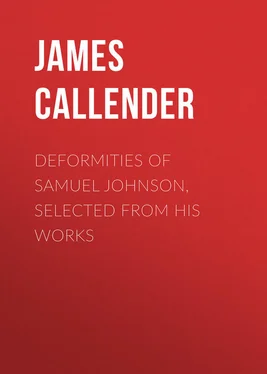James Callender - Deformities of Samuel Johnson, Selected from His Works
Здесь есть возможность читать онлайн «James Callender - Deformities of Samuel Johnson, Selected from His Works» — ознакомительный отрывок электронной книги совершенно бесплатно, а после прочтения отрывка купить полную версию. В некоторых случаях можно слушать аудио, скачать через торрент в формате fb2 и присутствует краткое содержание. Жанр: foreign_antique, foreign_prose, на английском языке. Описание произведения, (предисловие) а так же отзывы посетителей доступны на портале библиотеки ЛибКат.
- Название:Deformities of Samuel Johnson, Selected from His Works
- Автор:
- Жанр:
- Год:неизвестен
- ISBN:нет данных
- Рейтинг книги:4 / 5. Голосов: 1
-
Избранное:Добавить в избранное
- Отзывы:
-
Ваша оценка:
- 80
- 1
- 2
- 3
- 4
- 5
Deformities of Samuel Johnson, Selected from His Works: краткое содержание, описание и аннотация
Предлагаем к чтению аннотацию, описание, краткое содержание или предисловие (зависит от того, что написал сам автор книги «Deformities of Samuel Johnson, Selected from His Works»). Если вы не нашли необходимую информацию о книге — напишите в комментариях, мы постараемся отыскать её.
Deformities of Samuel Johnson, Selected from His Works — читать онлайн ознакомительный отрывок
Ниже представлен текст книги, разбитый по страницам. Система сохранения места последней прочитанной страницы, позволяет с удобством читать онлайн бесплатно книгу «Deformities of Samuel Johnson, Selected from His Works», без необходимости каждый раз заново искать на чём Вы остановились. Поставьте закладку, и сможете в любой момент перейти на страницу, на которой закончили чтение.
Интервал:
Закладка:
James Thomson Callender
Deformities of Samuel Johnson, Selected from His Works
INTRODUCTION
During the early part of his literary career, James Thomson Callender (1758-1803) 1 1 The DNB and the DAB both contain accounts of Callender (complete, of course, with lists of their primary sources) to which we are indebted for various details in our own sketch of his life. However, neither mentions his pamphlets on Johnson.
belittled Samuel Johnson; during the later, he denigrated Thomas Jefferson. Thus his reputation as a Scots master of scurrility and a vicious scandalmonger was earned on both sides of the Atlantic.
Probably because his anonymous pamphlets about Johnson's writings – the Deformities of Dr. Samuel Johnson, Selected from his Works (1782) and A Critical Review of the Works of Dr. Samuel Johnson (1783) – were not both ascribed to him until 1940, Callender first came into public notice in 1792, when in Scotland he published The Political Progress of Britain, or An Impartial Account of the Principal Abuses in the Government of this Country from the Revolution in 1688 . For these intemperate remarks, though anonymous, he was indicted in 1793 for sedition. He fled from Edinburgh and made his way, "with some difficulty," soon thereafter to Philadelphia.
During the first several years in Philadelphia, he was reporter of the Congressional debates for the Philadelphia Gazette and did some editorial hackwork. He also published the third edition of the Political Progress , which was favorably noticed by Jefferson. In 1797 he published The History of the United States for 1796: Including a Variety of Particulars Relative to the Federal Government Previous to that Period , which brought the charge against Alexander Hamilton of "a connection with one James Reynolds for purpose of improper pecuniary speculation." Hamilton, after making preliminary preparations for a duel, came to the conclusion that he would have to sacrifice his private reputation to clear his public actions. So he calmly wrote, "My real crime is an amorous connection with his [Reynolds'] wife for a considerable time, with his privity and connivance, if not originally brought on by a combination between the husband and wife with the design to extort money from me." 2 2 Quoted from Hamilton by David Loth in Alexander Hamilton: Portrait of a Prodigy (New York, 1939), p. 249.
In The Prospect before Us (1800), written under the secret patronage of Jefferson, Callender assailed John Adams and lashed through Adams at his predecessor, Washington. Ending his diatribe, he said, "Take your choice, between Adams, war and beggery and Jefferson, peace and competency." Because of his remarks about Adams, he was tried under the Sedition Law, fined $200, and sent to prison for nine months. While in prison he wrote two fiery anti-Federalist pamphlets, for which Jefferson advanced money under ambiguous terms. When Jefferson became President in 1801, he pardoned Callender (and all others convicted under the unwise Sedition Law), and Callender's fine was remitted. But Callender was not satisfied; he wanted Jefferson to appoint him postmaster of Richmond, Virginia. Jefferson refused, in spite of the tone of blackmail which now pervaded Callender's importunities. Soon he turned his political coat and began editing the most scurrilous anti-Jefferson paper in the country, the Richmond Recorder , to the infinite delight of the Federalists, who immediately circulated the periodical far and wide. Callender accused Jefferson of dishonesty and cowardice, but pure malice inspired his most injurious charges.
It is well known that the man, whom it delighted the people to honor , keeps … as his concubine, one of his own slaves. Her name is Sally. The name of her eldest son is Tom. His features are said to bear a striking resemblance to those of the president himself… By this wench Sally, our President has had several children. There is not an individual in the neighborhood of Charlottesville who does not believe the story; and not a few who know it … Behold the favorite! the first born of republicanism! the pinnacle of all that is good and great! If the friends of Mr. Jefferson are convinced of his innocence, they will make an appeal… If they rest in silence, or if they content themselves with resting upon a general denial , they cannot hope for credit. The allegation is of a nature too black to be suffered to remain in suspense. We should be glad to hear of its refutation. We give it to the world under the firmest belief that such a refutation never can be made . The AFRICAN VENUS is said to officiate as housekeeper at Montecello. When Mr. Jefferson has read this article, he will find leisure to estimate how much has been lost or gained by so many unprovoked attacks upon J. T. Callender! 3 3 From the Richmond Recorder as printed in the New York Evening Post , 10 September 1802; quoted from Jefferson Reader , ed. Francis Coleman Rosenberger (New York, 1953), pp. 109-111.
Callender's ignominious end came on 17 July 1803. The Gentleman's Magazine declared (LXXIII [September 1803], 882) that he, "after experiencing many varieties of fortune as Iscariot Hackney … drowned himself … in James River": the coroner's jury, however, declared that his death was accidental, following intoxication.
There can be scant doubt that the Deformities and A Critical Review 4 4 There were apparently three editions of A Critical Review : (1) Edinburgh: Printed for J. Dickson, and W. Creech, 1783. (2) Second Edition. London. Printed for the Author, and sold by T. Cadell and J. Stockdale; at Edinburgh, by J. Dickson and W. Creech, 1783. (3) London. Printed for R. Rusted, 1787. We are indebted to the Pierpont Morgan Library for a photographic reproduction of its copy of the first edition of the pamphlet.
have a common origin. The paper, type, and makeup of the title-pages indicate that they were issued from the same press. In the "Introduction" to A Critical Review , the statement is made that "The author of the present trifle was last year induced to publish a few remarks on the writings of Dr. Samuel Johnson… Like the former essay, these pages will endeavour to ascertain the genuine importance of Dr. Johnson's literary character" (pp. iii, v). In the text on page 50, the Deformities is cited in proprietary tones; and it is also mentioned in notes on pages 19, 37, 55, and 63. Moreover, the tell-tale words "deformities" and "deformity" appear (pp. 31, 43) in the text, and there is an advertisement for the Deformities on page 72.
An attempt to identify the author of the Deformities was made by George Steevens when it appeared. In a letter to William Cole dated 14 May 1782, he says that it was "written by a Club of Caledonian Wits." 5 5 Brit. Mus. Addit. MS 6401, f. 175 b. Part of this letter is quoted by L. F. Powell in Boswell's Life of Johnson , IV, 499 (cited hereafter as Life ).
The Critical Review for August 1782 (LIV, 140) surmised that "the pamphlet … is apparently written by some angry Caledonian, who, warmed with the deepest resentment for some real or supposed injury, gives vent to his indignation, and treats every part of Dr. Johnson's character with the utmost asperity." A month later, the Gentleman's Magazine (LII [September 1782], 439), "reciting the circumstance" of the origin of the Deformities , contended that it was a revenge pamphlet inspired by an anti-Ossian publication by William Shaw ("Nadir" Shaw, in the Deformities ), who "'denied the existence of Gaelic poetry…'" "Dr. Johnson was his patron; and THEREFORE this Essayist, 'by fair and copious quotations from Dr. Johnson's ponderous performances, has attempted to illustrate'" his extraordinary defects. And in February 1783 (LXVIII, 185-186), the Monthly Review briefly noted:
Интервал:
Закладка:
Похожие книги на «Deformities of Samuel Johnson, Selected from His Works»
Представляем Вашему вниманию похожие книги на «Deformities of Samuel Johnson, Selected from His Works» списком для выбора. Мы отобрали схожую по названию и смыслу литературу в надежде предоставить читателям больше вариантов отыскать новые, интересные, ещё непрочитанные произведения.
Обсуждение, отзывы о книге «Deformities of Samuel Johnson, Selected from His Works» и просто собственные мнения читателей. Оставьте ваши комментарии, напишите, что Вы думаете о произведении, его смысле или главных героях. Укажите что конкретно понравилось, а что нет, и почему Вы так считаете.












